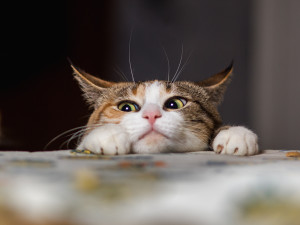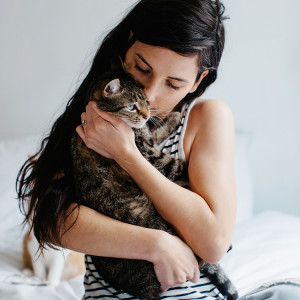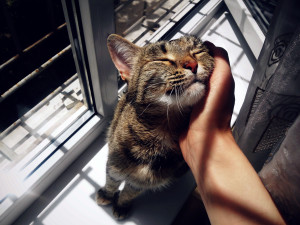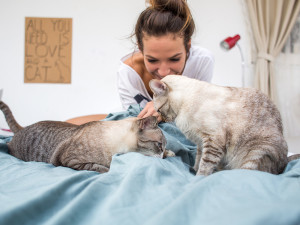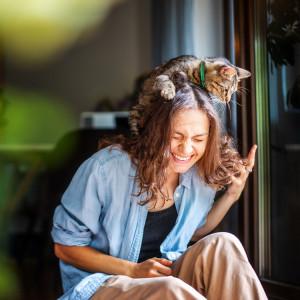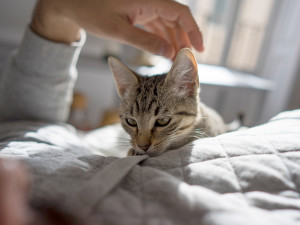Why Does Your Cat Rub Against You?
All that cat hair on your pants is just a bonus.

Share Article
In This Article:
Why Is My Cat Rubbing Against Me? Why Does My Cat Aggressively Rub Against Me? How To Respond to Your Cat Rubbing Against You Reasons Why Cat Doesn’t Rub Against Me Frequently Asked Questions
Cats often let their bodies do the talking, whether head butting (or bunting) their favorite person or gently rubbing up against your legs as you cook. But what exactly is your cat saying when they rub against you?
“Rubbing absolutely is a way cats show affection,” cat behaviorist Kristiina Wilsonopens in new tab says. “Cats have scent glands in their cheeks, chin, and paws, and rubbing those areas of their bodies on you or around the house are ways for them to mark their territory as safe and theirs.”
What does it mean when my cat rubs against me? The answer is far from short or definitive, but there are several reasons why your cat may use rubbing against you as a way of expressing themselves.

Why is my cat rubbing against me?
“My cat rubs their head against me — is my cat happy to see me?” Maybe.There are actually a number of reasons why your cat may rub against you, and a single instance could include several meanings at once.
Scent-marking
Cats rub against their humans “as a sign of affection,” Wilson says. “They are marking you as ‘theirs’ with the scent glands in their cheeks, as well as marking you as a safe person. This also helps create a communal smell in the family.”
The scent glands in a cat’s cheeks (and chin, the top of their head, and the base of their tail) produce pheromones, which cats can smell but humans can’t. Cats use these pheromones to mark territories (and people) as theirs, but these scents don’t last forever, so they will rub against you again to replace the scent.
Greeting and showing affection
Rubbing their head against you is often a cat’s gentle way of saying hello and means they’re happy to see you. Your cat may do this if they haven’t seen you for a while, like after you return from work or a night out, and even stray cats may rub against humans or other cats as a form of greeting.
“If your cat comes to greet you when you come home, if they greet you with an ‘up’ tail (held vertically), if they rub against you or stand up on their hind legs for pats or a greeting — so many different ways to show affection,” Wilson says.
Seeking attention
Gentle rubbing or head butting is a sweet yet effective way for your cat to grab your attention. They may want food, pets, or playtime, and if you give them what they want, your cat will know this method gets results.
Why does my cat aggressively rub against me?
A gentle head butt can be sweet, but if your cat’s rubbing against you becomes overly intense or aggressive, it may be time to give them space. Cats can be easily overstimulated, so too much petting or rubbing can lead to more violent actions and even biting. This is why it’s important to learn your cat’s body language cuesopens in new tab: so you know when they’ve had enough.
Territorial marking or jealousy
Every time they display this mysterious behavior, you may think, Why is my cat hissing but rubbing against me? It’s probably harmless, but it can be related to some jealousy they may be feeling. Cats are territorial and naturally claim and mark their territoryopens in new tab, but your cat can become aggressive in their marking. If your cat hisses or acts violent, take a step back and let them calm down before approaching again. If the aggressive or jealous behavior persists, consult a cat behaviorist. Always make sure to identify and respect your cat’s boundariesopens in new tab.
Health concerns
Rubbing against people (and furniture) is a normal cat behavior, but if your cat starts rubbing against you suddenly or does so more than normal, it may be time to visit the vet. You’ll want to rule out any potential medical causes, such as:
Allergies
Fleas, mites, or other parasites
Skin conditions
Ear infection
Neurological disorders
How to respond to your cat rubbing against you
Because your cat rubbing against you can be a sign of affection, it’s often fine to just absorb the love. If your cat is asking for attention or pets, you can certainly oblige. Just be careful about always responding to requests for food. It’s important to keep your cat on a healthy diet and avoid overfeeding.
Reasons why my cat doesn’t rub against me
If your cat doesn’t rub against you, that’s not a sign that they don’t love you! Cats show affection in a number of ways, and each cat has a different way of expressing themselves. Instead, your cat may:
Snuggle up beside you (or on top of you)
Stare at you and blink slowly
Roll over for belly rubs (yes, some cats do this)
Knead you like dough
“Cats are all unique so look out for your cat’s own ways that they show happiness,” Wilson says. “Slow blinks, purring, and kneading are also great ways to know that your cat is happy.”
FAQs:
Why does my cat rub his face in my face?
Your cat may rub their face on your face as a way of marking you as their person. This close contact can also be a way to show affection or greet you.
Why do cats put their butt in your face?
Cats are notorious for sticking their butts in their humans’ faces, and this is, weirdly, yet another way they show affection. It’s definitely attention-grabbing.
References
Cler, Kendal. Owner Perceptions of Cat-Human Communication Owner Perceptions of Cat-Human Communication Part of the Animal Studies Commons, and the Other Communication Commons.
Haywood, Camilla, et al. “Providing Humans with Practical, Best Practice Handling Guidelines during Human-Cat Interactions Increases Cats’ Affiliative Behaviour and Reduces Aggression and Signs of Conflict.” Frontiers in Veterinary Science, vol. 8, 23 July 2021, https://doi.org/10.3389/fvets.2021.714143. Accessed 21 Nov. 2021.
What to Do If Your Cat Is Marking Territory. www.orangecountync.gov/DocumentCenter/View/16688/Cat-Marking-Territorypdf. Accessed 21 Nov. 2024.

LeeAnna Buis, CFTBS, FFCP
LeeAnna Buis has adored cats her entire life and thought she knew them inside out and sideways. But it wasn’t until she worked with a feline behavior consultant that she fully understood how incredible, complicated, and inspiring they really are. She made a career change, starting the certification process to become a behavior consultant right away. She discovered what unique, fascinating, complex creatures cats are and knew this was what she wanted to do with her life — help others on a similar journey to truly knowing, loving, and appreciating their cats.
LeeAnna earned her certification through Animal Behavior Institute, where she received the certified feline training and behavior specialist (CFTBS) designation.
Related articles
![Cat being happily pet in the sunshine of a window]()
How to Pet a Cat (Without a Scratch)
There is a right and wrong way.
Do Cats Get Jealous?
Is there a green-eyed monster hiding in that adorable ball of fluff?
Why Is My Cat Suddenly Clingy?
They’re never far away, but you’d like a little distance.
Why Do Cats Put Their Butt in Your Face?
Oh, hello.
Why Does My Cat Sleep at My Feet?
Other than the fact that they love you so very much.
![kitten sleeping on top of person]()
Why Does Your Cat Sleep on You? 7 Reasons and What It Means
Not into cuddling? Too bad—they’re spending the night.


